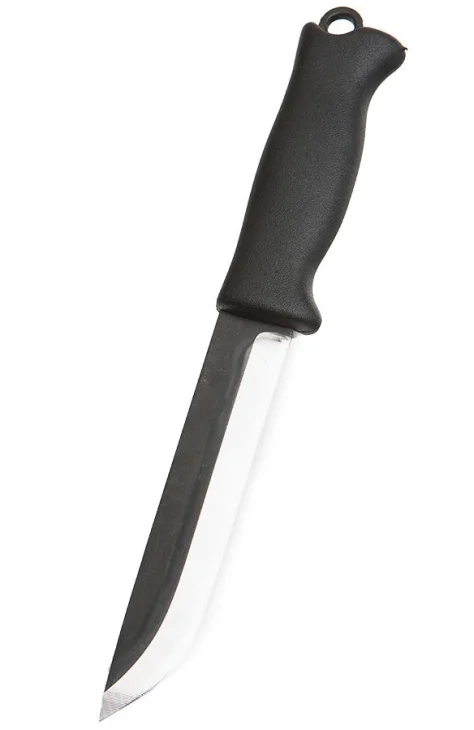
This longer Jääkäripuukko 140 is better at hacking through saplings and batoning through firewood than 110. The longer blade isn’t quite as dextrous, but it is still well-suited for most tasks in the bush. It is made from quality carbon steel and has a traditional Finnish puukko blade profile with a slight drop point. This knife isn't designed to sit on a shelf for decoration; it is an honest tool made for hard work. Jääkäripuukko comes in various sizes. Check out the others, too.
Our new and shiny webstore is up and running – in celebration, this product has a 20 % discount for two weeks (NOV 28 – DEC 11). The offer applies to items currently in stock. All opening offers can be found on this page.
- Medium-large general-purpose utility knife, a solid choice for most situations
- Traditional puukko-style blade profile with a drop point
- High scandi-style grind with a secondary micro bevel
- Spine ground and beveled to strike sparks from ferro rods
- Full/stick hybrid tang with textured over-molded rubber grip
- Protruding bare tang head with a lanyard hole
- Also available as a dull training knife
- Made in Finland
Carbon steel blade
All Terävä carbon steel knives are made from 80CrV2 tool steel, a trusted choice in Finnish knife manufacturing for decades. This knife has a traditional and proven functional Finnish puukko profile with a drop point. The thickness of 4,2 mm (0.17") makes this a bit more robust than most old-timey traditional Finnish puukkos. The profile is a Scandi grind with a tiny secondary bevel, currently the most commonly used style in Finnish puukkos.
The tang runs all the way through the grip and comes out the back, forming a little knob with a hole in it for lanyards and such. The knob can also be used to hit things naturally.
The strong blade can take a beating. You can use the Jääkäri for batoning without a problem; just don´t hit your fingers unless yours are strong like steel.
Sturdy rubber handle
The rubber grip is somewhat ergonomically shaped but not one of those crazy finger groove things. A small finger guard on the front, a little belly in the middle, and a knob at the back to keep your hand from slipping and also make it possible to use a Leuku-style chopping grip.
Choose the right sheath for you
Terävä Jääkäripuukko can be carried on the belt, on a vest, or whichever way you may need. The sheath material options are traditional leather and modern Boltaron.
Leather Sheath
The sturdy leather sheath hangs on a 6 cm (2.35") belt loop and is built with a roomy plastic liner to let water and crud run through it and out the hole at the end. When drawing the knife, the edge runs nicely between the two leather sides, not cutting it up as is a common downside of the traditional "sock" style puukko sheaths.
The sheath retains enough tension to keep the puukko in place even without closing the snap fastener. So, around the camp, you don´t need to open and close the sheath constantly; just remember to snap it shut when you're on the move!
Do not force the knife out of the sheath without opening the press stud! Although this can be done, it is not good for the press stud in the long run and may damage it. Just open the snap before pulling out the knife. It's best to oil the snap fastener once in a while to prevent it from becoming stiff and nasty.
Right or left?
The words "Right" and "Left" in the menu might confuse some folks, so let’s clarify it. It refers to your dominant hand, not the side of your body. You pull your knife out of the "Right" sheath with your right hand (normal grip), no matter where the sheath is – left side, right side, or on the front. The "Left" sheath works the same way for the left-handed folks.
If you prefer to pull your knife, e.g., with your right hand from the right side, with your knuckles between your body and the knife handle, only then take the "Left" sheath so the blade edge will face forward. Simple!
Boltaron Sheath
Boltaron is a bit like Kydex but offers better performance in the extreme ends of temperatures. This sheath allows carrying the knife on your belt, on the vest, pack, or anything with PALS webbing.
These are suitable for both right-handed and left-handed users. In addition to military applications, they also work in outdoor and everyday use. The clips are sold separately
Domeniko M.
Johan S.
Stéphane F.
Store
00390 Helsinki
Mon-Fri 10:00-20:00
Sat 10:00-19:00
Sun 12:00-17:00
Exceptions to opening hours on the Store page.
Propaganda
Contact us
[email protected]
Mon-Fri 08:00-20:00 EET
Sat 10:00-18:00 EET
Sun 10:00-18:00 EET
See all Contact Information.